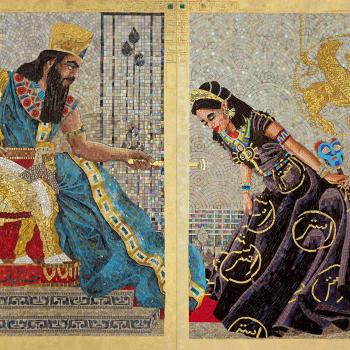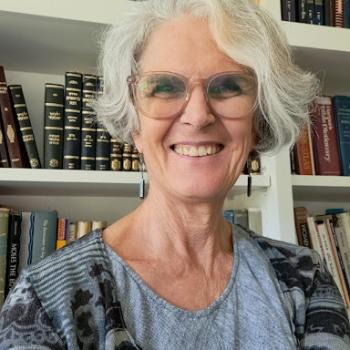Editors' Note:This article is part of the Public Square 2014 Summer Series: Conversations on Religious Trends. Read other perspectives from the Jewish community here.
I'm drawn to liminal spaces: twilight and dawn, half-waking dreams, that slippery spot between intuition and intellect. I'm not surprised. I've spent most of my life in between.
Growing up, I got a lot of flack because I was only half Jewish. Surprisingly, I got it from my friends who were Reform or even secular—those who you'd think wouldn't care. Even outside of Halacha, there seemed to be great interest in firming up the lines between those in the tribe and those outside of it. As the realities of modern Jewish identity got more and more complicated, those who made the cut by traditional standards seemed increasingly eager to reinforce the boundaries and push people out. I've never understood why. How does it serve one Jew to exclude another?
I knew I was a Jew as deeply as I knew I was a woman. I've seen the letters and documents from my father's side of my family, all in Yiddish. I've heard the stories of my great-grandparents' life in Poland and their frantic flight to Los Angeles to escape pogroms. I've read the postcards from my great aunt Pesha, who sent my family continual updates as she and her family attempted (and eventually failed) to escape the Nazis. My Jewishness is written all over my hair and face. People can tell at a glance. Being told I wasn't Jewish felt like being told the sky was purple. It just wasn't true.
If I'd dedicated myself to religious Judaism, things might have worked themselves out. I might have formally converted, or I might have found synagogues willing to accept me.
But nothing's ever simple, is it?
* * *
In High School I discovered Witchcraft. From the moment a friend of mine explained it to me, I knew I had come home.
I think Wicca is common enough nowadays that most people have heard of it, but I still think a quick note on the word "witchcraft" is due. The concept is in a funny transitional time, another in-between space. Witchcraft used to be thoroughly associated with devil worship and malicious magic. Benevolent magic practitioners—healers and card readers and the like—were called Cunning Folk. Now, though, large swaths of Witchcraft in the West are rooted in reverence for nature and Paleolithic age-inspired Goddess worship. The founders of our various traditions reclaimed the word Witch from those who used it to punish and kill anyone (mostly women) who strayed from mainstream religion and culture. For many of us—perhaps most of us—God/dess is a nondual, immanent concept. God is the universe is God. God is our mother, and God is us—our bodies, our actions, our minds.
So, what do witches do? I can only speak for myself. I practice in the Reclaiming Tradition, which is similar to but distinct from the various traditions within Wicca. Reclaiming itself is an offshoot of the Feri Tradition. I consider nature sacred, of course, along with the four classical elements: Earth, Air, Fire, and Water (the four things which, as Starhawk posits in her novel The Fifth Sacred Thing, should never be bought or sold). Like many Witches, I'm polytheistic with a nondual undercurrent, and a devotee of two specific deities. I love to dance and drum and sing. I keep an altar and pray in the mornings and evenings.
The main focus of my practice, the one thing that I prioritize above all other experiences, is healing. Through my Witchcraft I seek to heal my habitat, my community, and myself.
Witches sometimes talk about "walking the hedge"—that line between civilization and the wildwood, the perimeter of what we know, the permeable barrier between mundane thought and ecstatic consciousness. The in-between places, many will tell you, is where the most powerful magic can be found.
Yet we fear liminal spaces. We erect no end of barriers and rules to stamp them out and pretend they don't exist. Even as I prepare for the backlash this article will cause, I'm dealing with a blow-up on the Pagan blogs over whether Jews are allowed to engage with Celtic deities.
Maybe we're simply afraid of their power.
* * *
For many years, my Jewish heritage didn't play a big role in my identity. I attended my college's community Seders, even went to a Yom Kippur service once, but I never really found a way in.
Then I discovered Yiddish.
Over the course of several years, I took classes at the Arbeter Ring, American Jewish University, UCLA, and even the Vilnius Yiddish Institute in Lithuania. (Go to Vilna right now, by the way, if you haven't already been. Go right now! It's one of my favorite cities in the world.) At the peak of my studies, I was able to read Sholem Aleichem in the original, albeit extremely slowly and with heavy use of my dictionary. I loved the sounds of the language, its humor and logic. I loved the way a word snapped into comprehension as I sounded out the letters. I loved the history of the Bund, the partisans, the countless writers and artists who worked within Yiddishkeit.




